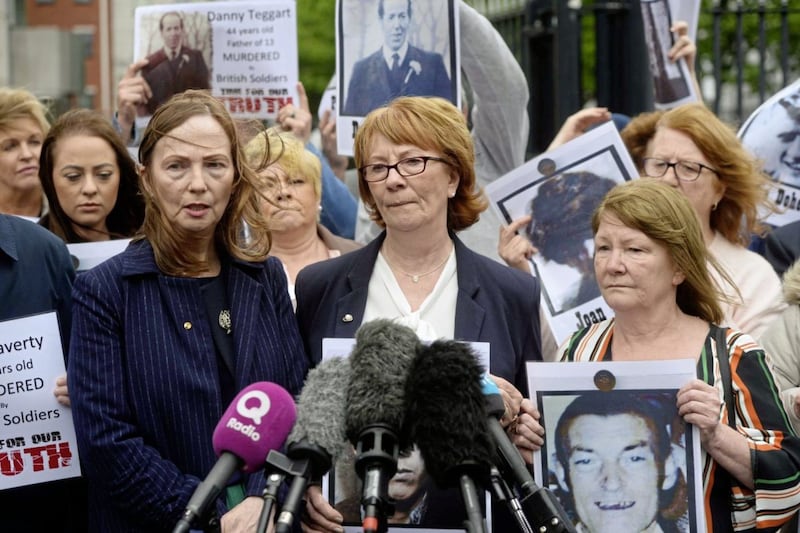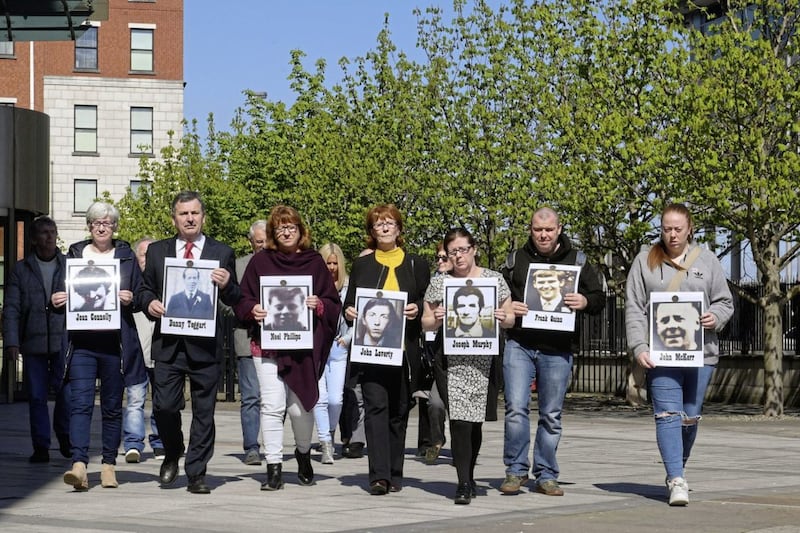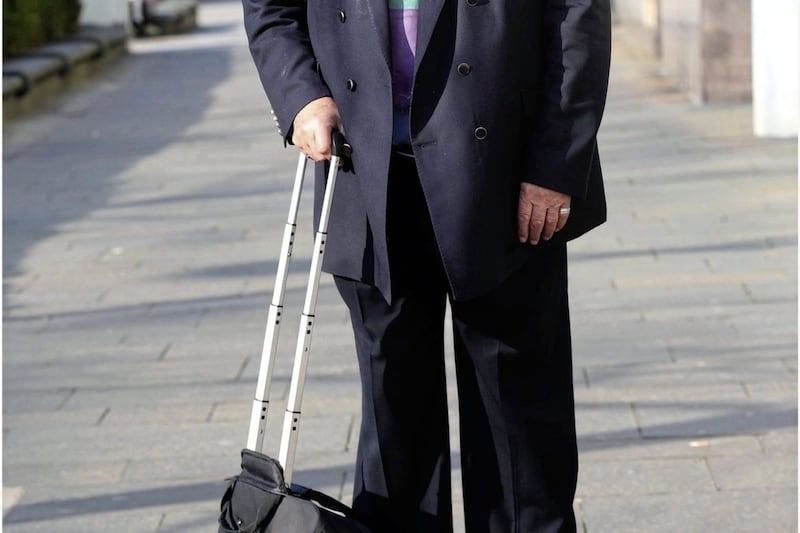FOR all his years coming to Northern Ireland, Michael Mansfield has yet to return to the Giant's Causeway, some seven decades after his first and so far only visit. He was about seven or eight, on holiday with his parents, when he went to see the famed lava formations.
"It's the one thing I remember. I was amazed and overwhelmed and it made such an impression on me, I remember thinking these rocks go under the sea and up the far side to Scotland," he tells me.
Arguably the pre-eminent QC of his generation, Mansfield has been back in Belfast recently, representing three of the families involved in the Ballymurphy shootings inquest.
Not a man shy of multi-tasking, he also remains involved in the inquiry in London into the Grenfel tower fire disaster.
Now 77, the veteran real-life Rumpole shows no sign of slowing down. How does he maintain his stamina?
"It's the anger at injustice. Even if I am not as fit as I was, that adrenaline will get me to the front line," he says.
Later this month he will also be in Belfast to take part in Féile an Earraigh, the West Belfast Spring Festival, at which he is giving a talk on his life and work.
Asked how often he has been to Ireland, north and south, over the years he says: "A lot".
That first trip all those decades ago was a kind of busman's holiday, since his father worked on the railways: "He got discounted travel, so he took us along the Irish coast."
Then during his own first marriage, Mansfield spent many family holidays just outside Cobh, Co Cork, which he was reminded of on a recent trip to Belfast's Titanic centre, Cobh, then called Queenstown, having been the ill-fated liner's final port of call.
"I have always loved Dublin as well and been there many times over the years – less so Belfast, until more recent times. But now my wife Yvette and I would come to Belfast at weekends. We both enjoy the ambience of the city, and the biggest thing is still the incredible welcome you get, even when people don't know who you are – they are so friendly."
Back in 1973, however, it was with "quite a sense of trepidation" that he came to Belfast as part of an inquiry into the impact of the then 'emergency legislation'.
"This was obviously part of the UK and yet it felt like you were living in a police state. We felt the presence of the security forces – at least, I did – and you had the feeling something could go badly wrong. I was quite shocked by the whole situation," he says.
"For me it was an eye-opening experience, and yet at the same time we got to meet Gerry Adams as well as the lord chief justice.
"These people were prepared to chat in a way in which people in England were not. It was ironic, that against a tense backdrop you could have these conversations."
A leading figure in many Northern Ireland-related court cases – the Price Sisters, the Birmingham Six and the Guildford Four, as well as the families of victims of Bloody Sunday (he spent almost four years in Derry) – Mansfield traces his interest in Irish affairs back to university.
"I became concerned about how the Irish were regarded by the English and that they had been extremely oppressed over decades – more than decades – and also the British did what they did elsewhere, particularly in Pakistan and the Middle East, namely, partition."
He describes the border as an "artificial boundary" which, of course, is at the centre of the ongoing Brexit "debacle" which might, just might, Mansfield says, bring the border to an end. Referring to the prospect of a border poll, he believes Brexit could create the conditions in which the frontier between north and south will disappear.
At first encounter Mansfield can come off as a bit of a toff, but it isn't long before his working-class credentials are soundly established, as well as his reputation as a republican, vegetarian and keen cyclist.
Born in Margaret Thatcher's constituency of Finchley in 1941, his parents were staunch Conservatives and he recalls his mother getting him to deliver Tory leaflets around the doors campaigning for Thatcher.
In return, she would get profusive thank-you letters from Mrs Thatcher, one of which a mischievous Mansfield later had framed and put up in the hall of his house, where it caused many eyebrows to raise.
In his personal life, undoubtedly Mansfield's most difficult case was the suicide almost four years ago of his daughter, Anna, which led to him and his wife setting up the Silence of Suicide group.
"I think more about Anna now that she is dead than I did when she was alive. But I have also learned that, hard though it is, that decision has to be respected," he says.
"People were shocked at Anna's funeral that in my speech I used the word 'suicide' and I realised it is such a taboo subject. Other people came up and thanked me for addressing what was the elephant in the room."
Mansfield had been due to meet Anna (44), who had children of her own, in London the day after she took her own life and admits he is still going through a grieving process.
Only relatively recently, he says, he became aware of the high incidence of suicide in Northern Ireland – and that it has increased significantly in the 20 years since the Good Friday Agreement.
"It is like a slow-release volcano. Although there is less tension, the trauma which was suffered is being passed on inter-generationally," he observes.
"It's not just the suicide that people don't talk about; it's the possibility they are going to lose their job [for instance]. I have been struck that you don't have to be clinically, mentally ill in order to have a link to the fatal decision to take your life.
“It’s ordinary people who are distressed by these pressures and feel there’s nowhere to go.”
Apart from the spring féile, Mansfield expects to be in Belfast until the end of May, or early June, for the Ballymurphy inquests, details of which he can't discuss at this time as because they are still being heard before the coronor's court.
"I am not allowed to make any comment about a case I am involved in. But there is no significant difference between Northern Ireland and England. We did have a similar process in the inquiry into the Hillsborough disaster which was held over two years," he says.
"You don't have a jury here, unlike in England, but the main purpose is to establish a narrative. We don't use the word 'verdict' any more, in England as well as here. But there will be conclusions."
He is far more forthcoming on the topic of Grenfel, which he views as richly symbolic of the state of politics and society more widely.
"The fact is that at the centre of one of the most major cities in the world you had this tower block wrapped in combustible materials – yet short cuts were taken and warnings were ignored.
"This was a very mixed block of people, like a village in the sky, all related to each other, but it was almost as if they didn't matter so much. It was social housing and it showed me there is still a class division, still a divide. We must learn from it."
:: Michael Mansfield will be in conversation with west Belfast human rights solicitor Pádraig Ó Muirigh at Gael-Ionad Mhic Goill, Whiterock Road, Belfast, on Tuesday March 12 at 7.30pm as part of Féile An Earraigh 2019.








